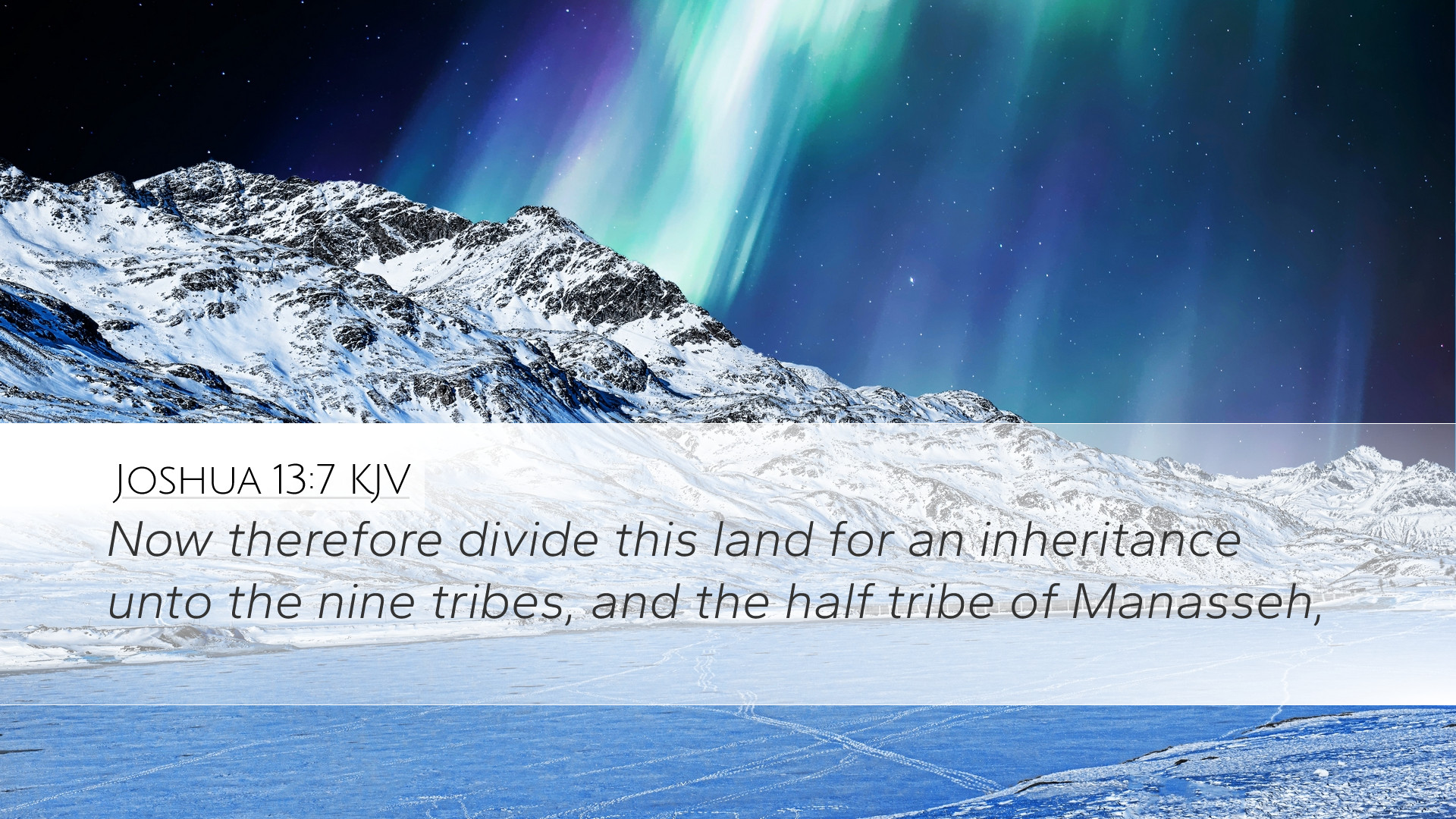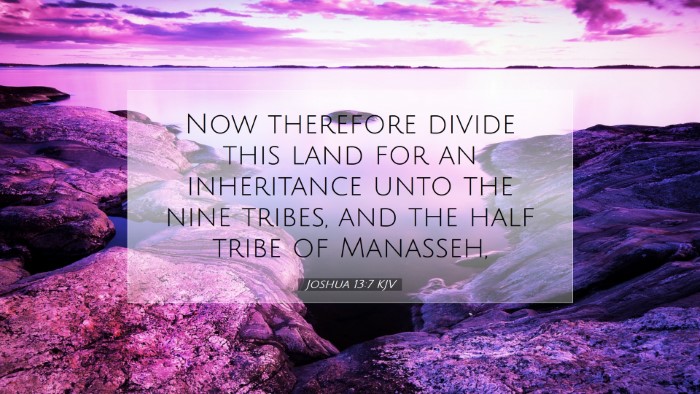Commentary on Joshua 13:7
Text of the Verse: "Now therefore divide this land for an inheritance unto the nine tribes, and the half tribe of Manasseh."
Introduction
The verse in question takes place in the context of the Israelites' settlement in the Promised Land. After numerous battles and the defeat of various nations, God commands Joshua to divide the land among the tribes. This division is not merely an administrative task; it holds deep significance for understanding God’s covenant promises, the nature of inheritance in Israel, and the familial and tribal identities of the Israelites. Public domain commentaries such as those by Matthew Henry, Albert Barnes, and Adam Clarke provide a wealth of insights into this verse.
Understanding the Context
The book of Joshua is a narrative of conquest and settlement, focusing on God’s faithfulness in fulfilling His promises to the Israelites. By the time we reach chapter 13, Joshua is advanced in years and the conquest of Canaan is nearing completion. The directive to divide the land indicates a transition from warfare to settlement—a critical moment in Israel’s history.
Significance of Inheritance
Inheritance in ancient Israel was a critical aspect of identity and stability. It encapsulated God’s promise to Abraham, Isaac, and Jacob. Albert Barnes emphasizes the theological implications of this inheritance as a fulfillment of God’s covenantal promises. Each tribe’s land was not just an economic asset but a divine right bestowed upon them as a people chosen by God.
Dividing the Land
The act of dividing the land further underscores God’s sovereignty. Adam Clarke comments on how the allocation was done through divine guidance, reflecting God's providential care for His people. This process involved careful consideration of each tribe’s needs and circumstances, revealing God's detailed involvement in the lives of His people.
The Nine and a Half Tribes
The mention of "the nine tribes and the half tribe of Manasseh" deserves special attention. Joshua 13:7 indicates that the land was allocated primarily to nine and a half tribes while the other two and a half tribes (Reuben, Gad, and half of Manasseh) had already received their inheritance on the east side of the Jordan River. Matthew Henry notes that this division reflects the unity and distinctiveness of the tribes: they were one nation yet diverse in their geographical allocations.
The Tribe of Manasseh
The reference to the half tribe of Manasseh is particularly interesting, as it highlights the complexities within Israelite tribal structures. Manasseh's division reflects both inclusion and distinct identity, as part of its inheritance lies in East Jordan, indicating a longing for cultural and geographical heritage distinct from the other tribes. Albert Barnes reflects on how this division posed both advantages and challenges for the unity of the Israelite nation.
The Role of Joshua
As the leader appointed by God, Joshua plays a pivotal role in this transition. His authority is reaffirmed in this chapter as he is commanded to oversee the division of the land. Matthew Henry indicates that Joshua’s leadership illustrates God’s intention to provide guidance and structure to the community: “A good leader raises the people to their responsibilities under God’s guidance.”
Theological Reflections
This verse invites deeper theological reflection on God's faithfulness and the nature of covenant. The inheritance of the land serves as a tangible reminder of God’s promises. Adam Clarke points out that the land itself represents spiritual inheritance—the broader promise of salvation and eternal life that believers enjoy through Christ. This connection emphasizes the continuity of God’s redemptive plan throughout Scripture.
The Importance of Land
Land in the biblical context is often associated with blessings and covenant. The allocation underscores the material aspect of Israel's relationship with God but also symbolizes spiritual truths. The land serves as a metaphor for the heavenly inheritance awaiting believers, as highlighted in the New Testament. Joshua's command can thus be seen as a precursor to the themes of inheritance explored in Hebrews 11:8-10, where Abraham looks forward to a better country.
Conclusion
In Joshua 13:7, the command to divide the land encapsulates key theological and historical dimensions of the Israelite identity. From the importance of inheritance to the manifestation of God’s promises, this verse serves as a rich source of insight for pastors, students, and theologians. The careful organization of the inheritance among the tribes not only illustrates God’s providence but also challenges contemporary readers to consider how they view their own inheritance in Christ.
Key Themes to Reflect Upon
- The Authority of God’s Leadership: The passage reflects God's sovereign will operating through human leadership.
- The Concept of Inheritance: Both physical and spiritual inheritance invite contemplation on what it means to belong to God's family.
- Tribal Identity in Unity: The duality of unity and diversity among the tribes presents lessons for the modern church.
- Faithfulness of God: The allocation of land is a testament to God's unwavering faithfulness to His promises.
Further Study Recommendations
For those seeking to delve deeper into the themes presented in Joshua 13:7, consider the following:
- Study the histories of each tribe and their inheritances as mentioned in subsequent chapters of Joshua.
- Examine the concept of inheritance in other parts of Scripture, such as Ephesians 1 and 1 Peter 1:3-4.
- Explore the leadership dynamics in biblical texts—how leaders are chosen and the implications of their decisions.
- Reflect on the significance of land in the broader narrative of the Old Testament and its relevance today.


